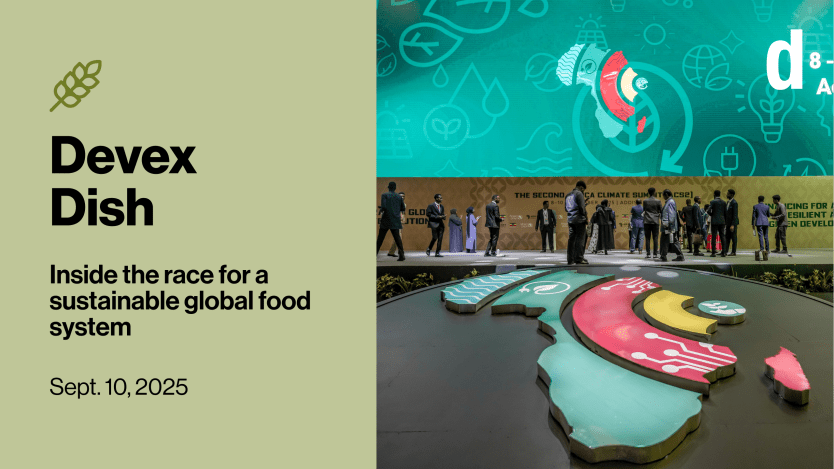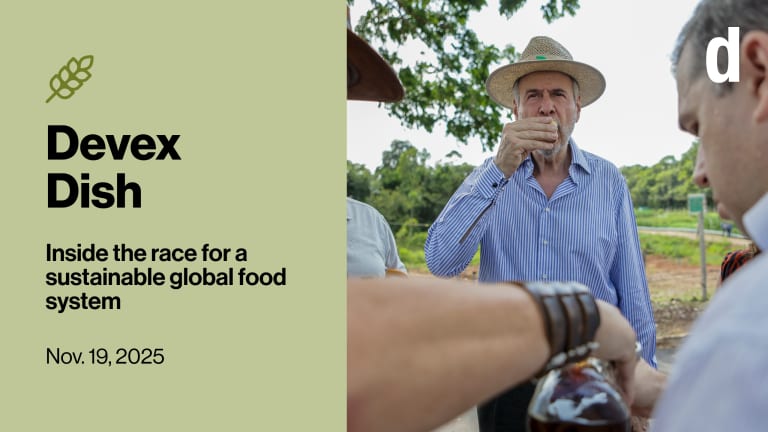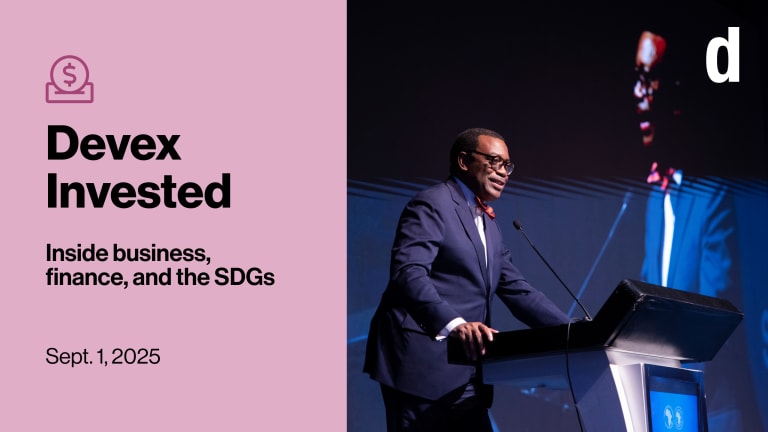
Greetings — and happy New Year’s Eve — from Addis Ababa, where the second annual Africa Climate Summit is underway. It’s taking place during Ethiopia’s 13th month: the country’s unusual solar calendar has 12 months of 30 days each, followed by a final month that lasts just five days. And that seems fitting, because the past few days have been so packed with speeches, sessions, and side events that it’s felt like a month.
Unlike global climate convenings where agriculture can feel like a side topic, here it’s front and center. After all, African climate conversations are rarely about mitigation — Africa contributes less than 4% of global emissions — but about adaptation: How people, especially those who directly rely on the land for their livelihoods, as most of the continent does, can navigate a hotter, more uncertain world. Whether it’s forest restoration, green corridors, or climate-smart farming, nearly every conversation comes back to food, land, and resilience.
“We must make Africa the place where the world sees climate goals achieved, where reforestation is not a pilot project but a culture, where climate-smart agriculture feeds millions, and where green corridors connect cities and rural areas in a shared economy of life,” Ethiopia’s Prime Minister Abiy Ahmed Ali said during the summit’s opening.
It was an inspiring vision — but it also underscored the gap between rhetoric and reality. Because while agriculture and food systems dominate the program here, financing hasn’t caught up. One figure often repeated: Just 1.5% of public climate finance for food systems is directed toward agroecological approaches — those rooted in sustainability, local knowledge, and long-term soil health.
Yigremachew Seyoum Lemma, senior technical adviser for the landscape restoration program at the World Resources Institute, highlighted the annual restoration funding gap of more than $20 billion and the financing “missing middle,” where microfinance is too small and commercial banking too risky. He argued that incentives are key if restoration is to succeed. “People should get at least some level of economic incentives from landscape restoration,” he said, “otherwise it’s difficult to convince local communities to restore their landscapes just to see benefits after 10 or 30 years.”
But while traditional financing might be scarce, there was an emphasis on stretching resources through innovation and efficiency.
One example is a crop insurance scheme from the World Food Programme in Ethiopia. In two years, it has reached 54,000 farmers in one region, covering them against drought, excessive rainfall, hailstorms, pests, and crop diseases. But what stood out wasn’t the product itself so much as the mindset shift that Allan Mulando — WFP Ethiopia’s head of food systems, resilience, and climate change — emphasized: “Don’t use insurance to offset the loss — use insurance to increase the willingness to invest despite the fact that there is a drought in there.” It turns risk management into a pathway for growth, empowering farmers to take risks and make the kinds of investments that build long-term climate resilience.
Another area ripe for expansion is early-warning systems, or tools that monitor climate and environmental data to predict droughts, floods, and other disasters before they hit. They’re critical to resilience. Yet, according to the African Union, only 10% of member states currently have national drought monitoring systems in place. The AU has pledged to extend early-warning access across the continent by 2027, in line with the ambition first set at the United Nations’ COP27 climate summit.
That gap makes the push for smarter, more accessible systems all the more urgent, with growing discussions on how to leverage AI, local data, and community networks to close it — while ensuring that new tools are inclusive and truly useful for those on the ground.
Technology is also carving out space in the mitigation debate. The Global Methane Hub tells me about its new Time2Graze initiative, which uses satellites to track pasture growth and pinpoint the short “sweet spot” when grasses are most nutritious. Hitting that window means cows get more energy from the same bite — producing more milk and meat while releasing less methane.
And with Ethiopia’s short 13th month now drawing to a close, so too does this summit. But if these past five days are any indication, they may well mark the start of a new season in Africa’s climate story.
Read: Satellites help farmers find grazing ‘sweet spot’ to cut livestock methane
+ Climate insurance is often pitched as a resilience solution, but will it save or fail us? Devex Pro members can read our story on the different sides of this debate. Not yet a Pro member? Start your 15-day free trial now to access the story and all our other exclusive content and virtual events.
Forests are forever
Brazil’s grand plan to protect tropical forests has got an update. The third draft of the Tropical Forest Forever Facility, released last month, adds stricter safeguards, direct community access, and new transparency rules ahead of its official launch at the COP30 climate summit in Belém this November.
The concept is simple: Tropical countries get $4 for every hectare of forest they conserve, paid out of a $125 billion fund managed by the World Bank. But this draft goes further than others before it. For the first time, 20% of the proceeds must flow directly to Indigenous peoples and local communities — either through national trust funds or an international agency such as the United Nations Development Programme. If those pathways aren’t in place, countries risk losing their payouts.
“I think the Brazilians did a good job of listening to the feedback around the key issues that were raised by civil society and indigenous peoples,” Andrew Deutz, the World Wildlife Fund’s managing director of global policy and partnerships, tells my colleague Jesse Chase-Lubitz. Other changes include a ban on fossil fuel investments and a technical committee to improve how forest degradation is measured.
For donors, the tighter rules may make the fund easier to back. For Brazil, it’s a high-stakes experiment — and its COP30 presidency may well be judged on the facility’s success. Yet, even as Brazil sharpens the design of its flagship forest fund, the broader picture around COP30 is looking less tidy. With just months to go, preparations for the Amazonian summit have been marked by logistical confusion and political headwinds — raising questions about what kind of COP Brazil will deliver.
Read: Brazil's forest finance plan takes shape ahead of COP30
And ICYMI: High stakes and uncertain plans as Brazil's Amazonian COP30 approaches
Nourishing Africa’s future
Bringing home the bacon
Your next job?
GIS Impact Assessment Specialist
Food and Agriculture Organization
Rome, Italy
Last week, the Africa Food Systems Forum in Dakar, Senegal, brought together 6,000 leaders from government, business, and civil society with a focus on mobilizing local solutions. It was the first major continental gathering of food systems experts since the U.S. aid cuts. According to Devex contributor David Njagi, there were five central lessons from the summit.
1. Financing. Liberia, Nigeria, Senegal, Somalia, Uganda, and Zimbabwe are “collectively targeting over USD 6 billion in mobilized investments” for food systems transformation, aiming to create jobs and build stronger value chains. Also at the forum, the Agri-Energy Coalition launched to tap renewable power for agriculture, and the Gulf Cooperation Council signed on to deepen cross-regional trade.
2. Nutrition. With malnutrition tripling in Africa in the past decade, experts spotlighted “opportunity crops” — long-overlooked and underinvested indigenous foods rich in nutrients — as a way to strengthen diets and fill the hungry season.
3. Youth. With 60% of Africans under 25 years old, the forum stressed that the next generation must be at the center of food transformation, from farming and processing to logistics and agritech.
4. Production vs. nutrition security. Despite yield gains since 1990, food and nutrition security still lag. Leaders pointed to the Comprehensive African Agricultural Development Programme Kampala Declaration as a road map to connect farm output with health, jobs, and sustainability.
5. Trade. The African Continental Free Trade Area is expanding, but experts warned that policy and infrastructure gaps must be fixed before African countries can fully trade among themselves.
Read: 5 takeaways from the 2025 Africa Food Systems Forum
Chew on this
About 1.2 million people in Madagascar are experiencing high levels of acute food insecurity, at IPC Phase 3 or above. This includes 29,000 people in IPC Phase 4 (emergency level). [Integrated Food Security Phase Classification]
The Middle East is grappling with the worst drought in decades. The situation is particularly severe in fragile Syria. [AP]
Evangelical Christians, strong backers of U.S. President Donald Trump, are pushing back on his decision to cut foreign aid — particularly ready-to-use therapeutic foods and other therapeutic food for malnourished people. [Politico]
How Trump broke the U.S. foreign aid budget process. [Devex]








